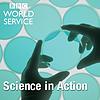
Science In Action by BBC World Service
BBC World Service
カテゴリー: 科学/医学
最後のエピソードを聴く:
The “dewilding” effects of fish farming and mariculture are in the spotlight this week. Farmed fish can impact marine ecosystems in several ways, and surprisingly one of those is the effect it has on consumer perceptions of the impact of eating farmed fish, as researchers Becca Franks of NYU and Laurie Sellars at Yale suggest.
Meanwhile, Manu Prakesh and colleagues at Stanford University in the US have found a remarkable plankton that can traverse the depths of the oceans by ballooning to five times its size, giving clues as to how an important carbon sink actually works. And Monika Bright at the University of Vienna has found animals and tubeworms living in the very rock below volcanic hydrothermal vents. Life finds a way…
…But not always. 445 million years ago the second worst mass extinction event wiped out countless species of life on earth. But why? This week astronomer Chrysa Avdellidou of Leicester University and colleagues say they have found the origin for a famous meteor event that also happened around that time.
Presenter: Roland Pease Producer: Alex Mansfield Production co-ordinator: Andrew Rhys Lewis
(Image: Aerial view of seagulls following a fishing trawler. Credit: Felix Cesare via Getty Images)
前のエピソード
-
475 - Marvels of life and deathThu, 17 Oct 2024
-
474 - Nobel convergenceThu, 10 Oct 2024
-
473 - Excesses of rainThu, 03 Oct 2024
-
472 - Historic weather extremes revealed using tree-ringsThu, 26 Sep 2024
-
471 - Flash floods in the SaharaThu, 19 Sep 2024
-
470 - A landslide-induced megatsunami in GreenlandThu, 12 Sep 2024
-
469 - Concerning viruses found in fur farmed animalsThu, 05 Sep 2024
-
468 - Wow! A mystery signal solvedThu, 29 Aug 2024
-
467 - Fisheries mismanagement uncoveredThu, 22 Aug 2024
-
466 - The spread of rabies into Cape fur sealsThu, 15 Aug 2024
-
465 - Detecting undetected bird flu casesThu, 08 Aug 2024
-
464 - Examining Nasa's new evidence for Martian lifeThu, 01 Aug 2024
-
463 - The human cost of the decline of nature’s carcass cleanersThu, 25 Jul 2024
-
462 - Destination Asteroid ApophisThu, 18 Jul 2024
-
461 - Hurricane Beryl’s trail of destructionThu, 11 Jul 2024
-
460 - Cleaner mining, cleaner batteriesThu, 04 Jul 2024
-
459 - On the road to halting HIVThu, 27 Jun 2024
-
458 - China: Scientific superpowerThu, 20 Jun 2024
-
457 - US bird flu response warningThu, 13 Jun 2024
-
456 - A humungous temporary tentacleThu, 06 Jun 2024
-
455 - Trusting AI with scienceThu, 30 May 2024
-
454 - The roots of fentanyl addictionThu, 23 May 2024
-
453 - Aurora Bore-WOW-lisThu, 16 May 2024
-
452 - Changing blood types and whale grammarThu, 09 May 2024
-
451 - Crossover infectionsThu, 02 May 2024
-
450 - An armada for asteroid Apophis?Thu, 25 Apr 2024
-
449 - Unexpected black hole in our galaxyThu, 18 Apr 2024
-
448 - Bird flu in AntarcticaThu, 11 Apr 2024
-
447 - Earthquake in TaiwanThu, 04 Apr 2024
-
446 - Star for a dayThu, 28 Mar 2024
-
445 - Out of AfricaThu, 21 Mar 2024
-
444 - Impacts of global warmingThu, 14 Mar 2024
-
443 - The first stars in the universeThu, 07 Mar 2024
-
442 - One million genomes in two dimensionsThu, 29 Feb 2024
-
441 - Largest ever covid safety studyThu, 22 Feb 2024
-
440 - Climate scientist wins defamation caseThu, 15 Feb 2024
-
439 - Particle physics v climate changeThu, 08 Feb 2024
-
438 - Unethical data gathering in ChinaThu, 01 Feb 2024
-
437 - Drilling into the pastThu, 25 Jan 2024
-
436 - Swine fever in South East AsiaThu, 18 Jan 2024
-
435 - Seeking supernovasThu, 11 Jan 2024
-
434 - Tackling tuberculosis in South AfricaThu, 04 Jan 2024
-
433 - Following in the footsteps of ancient humansThu, 28 Dec 2023
-
432 - Volcanic eruption lights up IcelandThu, 21 Dec 2023
-
431 - The science of morning sicknessThu, 14 Dec 2023
-
430 - Can carbon capture live up to its hype?Thu, 07 Dec 2023
-
429 - All aboard the RRS Sir David AttenboroughThu, 30 Nov 2023
-
428 - Fires in the Pantanal wetlandsThu, 23 Nov 2023
-
427 - Volcanic rumblings in IcelandThu, 16 Nov 2023
-
426 - Sounds of the CapeThu, 09 Nov 2023























